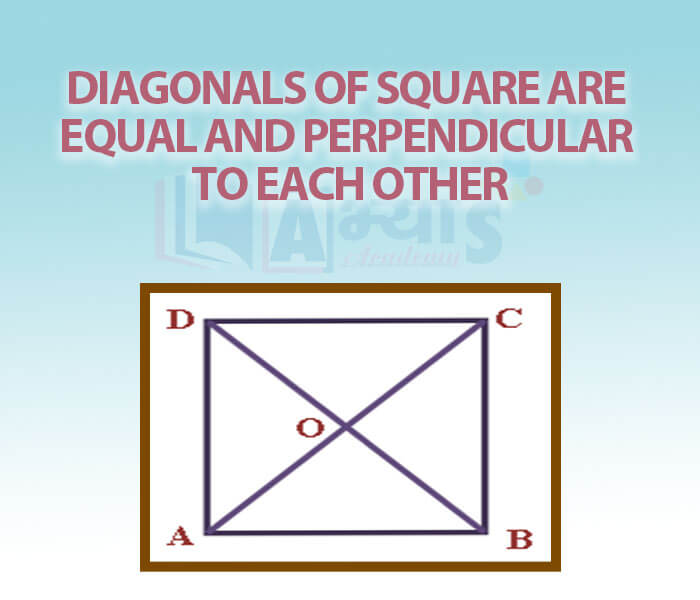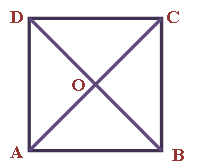Diagonals of Square Are Equal and Perpendicular to Each Other.











Diagonals of Square Are Equal and Perpendicular to Each Other.
Theorem: In a square the diagonals are equal and perpendicular to each other.
Given: A square ABCD. To Prove: AC = BD and AC and BC intersect perpendicularly. Proof: In AD = BC [ AB = AB [ Common] Therfore As ABCD is a square Therefore it is a parallelogram. Also diagonals of a parallelogram bisect each other.
In BO = DO [ From Equation (1)] BC = CD [ Sides of a square] OC = OC [ Common ] Therfore
But
Similarly we can prove that Hence Proved that In a square the diagonals are equal and perpendicular to each other. |  |
| Theorem : If the diagonals of a parallelogram are equal and intersect at right angles, then the parallelogram is a square. | |
Given : ABCD is a parallelogram, such that AC = BD and AC To Prove: ABCD is a square Proof: In AO = OC [ Diagonals of parallelogram bisect each other] BO = OB [ Common] Therefore AB = BC [CPCT] As ABCD is a IIgm and the adjacent sides are equal AB = BC Therefore AB = BC = CD= DA. In AD = BC [ Proved above] BD = AC [Given] AB = AB [ Common] Therfore
As ABCD is a parallelogram, AD || BC Now AD || BC and AB is the transversal
Now ABCD is a IIgm in which all sides are equal and one angle is |  |
Illustration: If the side of a square ABCD whose diagonals intersect at O is 6cm find the length of OA and OB;
Solution: As the diagonals of a square are equal and bisect each other perpendicularly We can say that OA = OB = x(say) ..............(1) and AB = 6cm ...................(2) [Given] Now
Substituting the values from Eq (1) and (2), we get
Hence OA = OB = |  |
In a square the diagonals are _________ and _________ to each other. | |||
| Right Option : C | |||
| View Explanation | |||
PQRS is a square. PR and SQ intersects at O. State the measure of | |||
| Right Option : B | |||
| View Explanation | |||
If the side of a square ABCD whose diagonals intersect at O is 10 cm find the length of OA and OB. | |||
| Right Option : B | |||
| View Explanation | |||
Students / Parents Reviews [10]
Abhyas is a complete education Institute. Here extreme care is taken by teacher with the help of regular exam. Extra classes also conducted by the institute, if the student is weak.

Om Umang
10thMy experience with Abhyas academy is very good. I did not think that my every subject coming here will be so strong. The main thing is that the online tests had made me learn here more things.

Hiya Gupta
8thMy experience was very good with Abhyas academy. I am studying here from 6th class and I am satisfied by its results in my life. I improved a lot here ahead of school syllabus.

Ayan Ghosh
8thOne of the best institutes to develope a child interest in studies.Provides SST and English knowledge also unlike other institutes. Teachers are co operative and friendly online tests andPPT develope practical knowledge also.

Aman Kumar Shrivastava
10thIt has a great methodology. Students here can get analysis to their test quickly.We can learn easily through PPTs and the testing methods are good. We know that where we have to practice

Barkha Arora
10thIt was a good experience with Abhyas Academy. I even faced problems in starting but slowly and steadily overcomed. Especially reasoning classes helped me a lot.

Cheshta
10thMy experience with Abhyas is very good. I have learnt many things here like vedic maths and reasoning also. Teachers here first take our doubts and then there are assignments to verify our weak points.

Shivam Rana
7thAbout Abhyas metholodology the teachers are very nice and hardworking toward students.The Centre Head Mrs Anu Sethi is also a brilliant teacher.Abhyas has taught me how to overcome problems and has always taken my doubts and suppoeted me.

Shreya Shrivastava
8thIt was good as the experience because as we had come here we had been improved in a such envirnment created here.Extra is taught which is beneficial for future.

Eshan Arora
8thI have spent a wonderful time in Abhyas academy. It has made my reasoning more apt, English more stronger and Maths an interesting subject for me. It has given me a habbit of self studying
